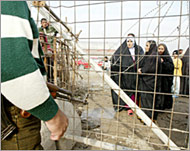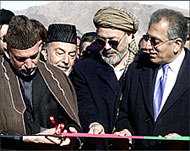The nation-building the US neglects
Some call it the forgotten war. US operations in Afghanistan, once the central front in the “war on terrorism”, are now characterised by some experts in Washington as lacking the funds, attention and military resources needed to “transform the war-torn nation into a stable democracy”.

With so much time and energy focused on the prospect of elections this summer in Iraq, it might be easy to forget that elections scheduled to be held in Afghanistan in June may be in doubt because of ongoing security concerns and voter registration problems.
While experts say significant progress has been made in rehabilitating the country, Taliban fighters, recalcitrant regional commanders and the relative absence of security forces outside of Kabul continue to plague the reconstruction effort, they say.
More than two years after the US military toppled the Taliban, some foreign policy analysts are questioning the Bush administration’s commitment to achieving long-term stability for the Afghan people.
“This is an administration that is great at making policy pronouncements, but is not that good on the day-to-day follow-up,” says Peter Singer, a foreign policy expert at the Brookings Institution, a Washington think-tank.
Iraqi distraction
If a deficit in attention and resources for Afghanistan does exist, most experts attribute that in large part to the war in Iraq, something that has consumed a significant portion of the administration’s focus and stretched US military forces to maximum capacity.
 |
|
Iraq’s decrepit infrastructure |
Sources inside and outside of the government say US operations in Iraq have drained necessary funding and manpower needed to rebuild Afghanistan.
“I think it was unwise to begin such a major operation in Iraq when Afghanistan’s reconstruction was just beginning,” said one government official who spoke on the condition of anonymity. “It created many problems because it siphoned off great amounts of money.”
While Congress approved $18.6bn for the reconstruction of Iraq in 2004, it gave Afghanistan $1.2bn.
Moreover, while the US military has 130,000 troops stationed in Iraq, it has 11,000 troops in Afghanistan, where, since August, roughly 550 people have been killed, many of them anti-government fighters.
Disparity
Experts such as James Dobbins, an international security analyst at Rand Corporation and President Bush’s former envoy to Afghanistan, said such a disparity in money and troop deployment is untenable, given the gravity of the country’s problems.
 |
|
President Hamid Karzai (L) opens |
“Afghanistan is the least resourced, large-scale American reconstruction programme ever,” Dobbins says.
Anatol Lieven, a senior associate at the Carnegie Endowment for International Peace, said the Bush administration had failed, thus far, to match its actions in Afghanistan with commitments made after the fall of the Taliban.
“The amount of money made available to Afghanistan, despite all the promises made two years ago is grossly inadequate compared to the money made available to Iraq,” Lieven says.
Containment only
The administration, Dobbins says, is pursuing a strategy of containment, preventing “terrorist groups” from regaining a foothold in Afghanistan, but not doing enough to lay the foundation for long-term peace and stability once US forces are withdrawn.
“With that minimal objective, the current level of involvement is probably inadequate,” Dobbins adds. “The problem with that is that you would have to maintain that [level of involvement] forever.”
The war in Iraq has clearly been a distraction from operations in Afghanistan, experts said, and some questioned the feasibility of undertaking two major nation-building efforts at the same time. While it is difficult to say whether the situation in Afghanistan would be markedly different without the Iraq war, the financial and military strain would be less severe, Singer said.
“I think we would have more activity on the ground [in Afghanistan],” he said. “I think we would have more money and resources on the ground.”
Western wealth
Despite such problems, the Bush administration should still be able to sustain reconstruction efforts in both Iraq and Afghanistan, no matter how daunting that task may be, Lieven said.
|
“Policymakers have a finite amount of time on things,” he said. “Iraq fills that space, that time and attention” Peter Singer, foreign policy expert, The Brookings Institution |
“Given the immense wealth in the West, we ought to be able to do both,” he said.
Even without the war in Iraq, attention to Afghanistan inevitably would have waned, he said. Iraq, however, accelerated that process, grabbing the focus of Washington politicians who no longer viewed Afghanistan as a crisis situation, Singer said.
“Policymakers have a finite amount of time on things,” he said. “Iraq fills that space, that time and attention.”
For Afghanistan to become the political success story many people in the international community hoped it could be after the fall of the Taliban, the US must devote sufficient time and energy to helping the new government rebuild its fractured national identity, one US official said.
Vital infrastructure
“I think the most important thing in Afghanistan is to work to build the infrastructure of a nation out of a conglomerate of ethnic groups who do not trust each other,” the official said.
As difficult as that task may be, most Afghans share the desire to establish a unified country, despite lingering ethnic tensions between Uzbeks, Tajiks and Pashtuns, Dobbins said.
“They don’t want a greater Uzbekistan or Pakistan,” he said. “There is competition, but competition within a greater framework which is Afghanistan.”
 |
|
Afghan soldiers have been drawn |
For such a national vision to become a reality, the Bush administration must do more to allow Afghanistan’s different ethnic groups to pursue common goals, such as constructing irrigation systems and building roads throughout the country, Lieven said.
The top US commander in Afghanistan has recently announced that the military is pursuing a more aggressive and expansive plan to combat Taliban fighters thought to be based along the border with Pakistan.
More important than money or troops, though, is the understanding that the US must pledge to stay the course in the years ahead, Lieven said.
“Whatever we do, however successful we are, it has to be based on the commitment that we will be there, not only five or ten years from now, but 20 years from now as well,” he said.